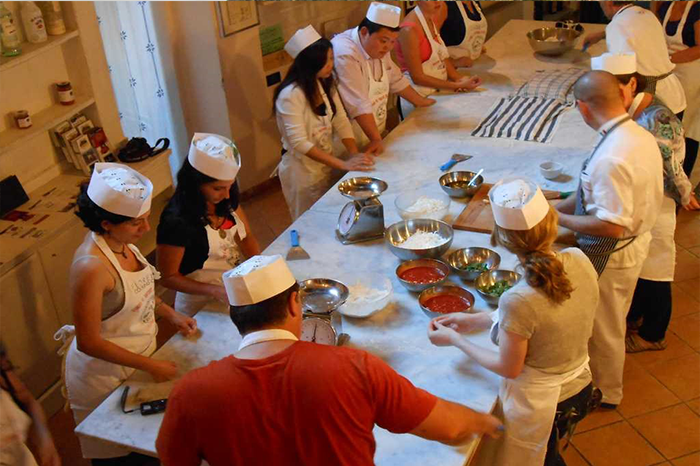
Embark on a journey of discovery with Culinary Travel and Cultural Immersion, where we delve into the rich tapestry of world cultures through their traditional cuisines and immersive experiences.
Discover how these two elements intertwine to create unforgettable adventures filled with flavor and cultural insights.
Cultural Tourism
Cultural tourism plays a crucial role in promoting understanding and appreciation of different cultures by allowing travelers to immerse themselves in the traditions, customs, and way of life of various communities. It provides a unique opportunity for individuals to learn about the history, art, cuisine, and daily practices of a specific culture, fostering respect and empathy towards diverse societies.
Examples of Cultural Tourism Experiences
- Visiting a local village in Japan during cherry blossom season and participating in a traditional tea ceremony.
- Exploring the ancient ruins of Machu Picchu in Peru with a knowledgeable guide who shares the history and significance of the site.
- Attending a Maasai tribal ceremony in Kenya and learning about their nomadic lifestyle and traditional dances.
Contribution to Tradition Preservation
Cultural tourism plays a vital role in the preservation of traditions and heritage by creating economic incentives for communities to safeguard their cultural practices. Through tourism, locals are encouraged to maintain their traditional crafts, rituals, and languages, ensuring that these aspects of their culture are passed down to future generations. Furthermore, the interaction between tourists and locals fosters a sense of pride in cultural identity and motivates communities to protect their heritage from external influences.
Eco-Tourism
Eco-tourism refers to responsible travel to natural areas that conserves the environment, sustains the well-being of the local people, and involves interpretation and education. It focuses on promoting conservation, supporting local communities, and minimizing the negative impact on the environment.
Principles of Sustainability and Conservation in Eco-Tourism
- Preserving natural habitats and biodiversity
- Respecting local cultures and traditions
- Supporting local economies and empowerment of indigenous communities
- Minimizing pollution and waste
- Providing environmental education and awareness
Examples of Eco-Friendly Practices in the Travel Industry
- Use of renewable energy sources in accommodations
- Reducing plastic waste by providing reusable bottles and bags
- Supporting local farmers and artisans through sourcing products locally
- Implementing carbon offset programs for flights
- Offering eco-friendly transportation options such as biking or walking tours
Benefits of Eco-Tourism
Eco-tourism benefits the environment by preserving natural resources, protecting wildlife habitats, and promoting conservation efforts. It also benefits local communities by creating sustainable livelihoods, preserving cultural heritage, and empowering indigenous populations.
Culinary Travel
Culinary travel plays a significant role in immersing oneself in a destination’s culture through its food. It allows travelers to experience the local traditions, flavors, and ingredients that reflect the heritage and history of a place.
Personal Stories from Culinary Travel Experiences
Embarking on culinary travel adventures has led to unforgettable experiences and connections with different cultures. One memorable trip to Italy involved learning how to make handmade pasta from a local chef, providing insight into the importance of fresh ingredients and family recipes.
Another journey to Thailand introduced the vibrant and spicy flavors of authentic Thai cuisine, showcasing the balance of sweet, sour, salty, and spicy in each dish. These personal encounters with local food traditions have deepened my appreciation for diverse culinary practices around the world.
Importance of Traditional Cuisine in Preserving Cultural Identity
Traditional cuisine serves as a cornerstone in preserving a culture’s identity and heritage. Recipes passed down through generations carry the stories, values, and beliefs of a community, reflecting its history and traditions.
By embracing and celebrating traditional dishes, communities can maintain their cultural heritage and share it with others, fostering a sense of pride and connection to their roots. Preserving traditional cuisine is essential in safeguarding cultural diversity and promoting intercultural understanding through the universal language of food.
Historical Travel

Historical travel appeals to tourists seeking to delve into the past, uncovering the stories, events, and people that shaped our world today. It provides an opportunity to learn about different cultures, traditions, and civilizations by exploring historical sites and landmarks.
Popular Historical Travel Destinations
Historical travel destinations hold immense cultural significance, offering a glimpse into the rich tapestry of human history. Some popular destinations include:
- Rome, Italy: Known for its ancient ruins such as the Colosseum and the Roman Forum, showcasing the glory of the Roman Empire.
- Machu Picchu, Peru: An ancient Incan citadel nestled high in the Andes Mountains, providing insight into the Incan civilization.
- Cairo, Egypt: Home to the iconic pyramids of Giza and the Sphinx, showcasing the grandeur of ancient Egyptian civilization.
Impact on Heritage Conservation
Historical travel plays a crucial role in heritage conservation and historical site preservation. By attracting visitors to these sites, it raises awareness about the importance of preserving our cultural heritage for future generations. Additionally, tourism revenue can be channeled back into conservation efforts, ensuring the maintenance and protection of these valuable historical treasures.
Luxury Travel
Luxury travel refers to a high-end travel experience that focuses on providing exclusive and lavish amenities, services, and accommodations to travelers. It goes beyond the traditional idea of travel and aims to create a truly indulgent and memorable experience for those who can afford it. Luxury travel is often associated with cultural immersion as it allows travelers to engage with local cultures in a more intimate and personalized way.
Luxury Travelers Engaging with Local Cultures
Luxury travelers engage with local cultures by participating in unique and authentic experiences that are curated to provide a deeper understanding of the destination. This can include private tours led by local experts, exclusive dining experiences showcasing traditional cuisine, and interactions with local artisans and craftsmen. Luxury travelers also support local communities by staying in boutique hotels, shopping at local markets, and contributing to sustainable tourism initiatives.
Role of Luxury Travel in Sustainable Tourism
Luxury travel plays a crucial role in supporting sustainable tourism practices by promoting conservation efforts, preserving cultural heritage, and empowering local communities. Many luxury travel providers prioritize eco-friendly initiatives, support fair trade practices, and give back to the communities they operate in. By focusing on quality over quantity, luxury travelers contribute to the preservation of natural resources and the protection of cultural traditions, ensuring a more responsible and ethical approach to tourism.
Budget Travel
Traveling on a budget doesn’t mean sacrificing cultural immersion experiences. In fact, it can often lead to more authentic and meaningful interactions with local communities. Here are some tips and strategies for budget travelers looking to engage in cultural exploration:
Budget Travel Options in Different Regions
When it comes to budget travel for cultural exploration, different regions of the world offer unique opportunities and challenges. Here’s a comparison of budget travel options in various regions:
| Region | Benefits | Challenges |
|---|---|---|
| Asia | Low cost of living, affordable street food, rich cultural heritage | Language barriers, long travel distances |
| Latin America | Vibrant festivals, diverse indigenous cultures, budget-friendly accommodations | Transportation infrastructure, safety concerns in some areas |
| Europe | Historical landmarks, cultural events, extensive public transportation | Higher cost of living, crowded tourist attractions |
Benefits of Budget Travel for Cultural Exchange
Engaging in budget travel can promote cultural exchange and understanding in several ways:
- Encourages interaction with locals: Staying in budget accommodations and dining at local eateries often leads to meaningful conversations and insights into local customs.
- Promotes sustainability: By supporting small businesses and local artisans, budget travelers contribute to the preservation of traditional crafts and practices.
- Fosters empathy and tolerance: Experiencing different ways of life on a budget can help travelers develop a deeper appreciation for cultural diversity and bridge gaps in understanding.
Backpacking
Backpacking offers a unique way to travel that allows for deeper cultural immersion compared to other forms of travel. Backpackers often have the opportunity to connect with locals, experience authentic traditions, and explore off-the-beaten-path destinations.
Unique Cultural Experiences
- Interacting with locals on a more personal level, staying in guesthouses or homestays
- Participating in traditional ceremonies or festivals
- Learning local languages or dialects through immersion
- Exploring hidden gems and lesser-known cultural sites
Stories of Cultural Immersion
- Sharing meals with families in remote villages
- Joining community projects or volunteering initiatives
- Attending cultural performances or workshops
- Learning traditional crafts or skills from artisans
Challenges and Rewards
- Challenges: Language barriers, navigating unfamiliar terrain, limited resources
- Rewards: Deep cultural understanding, authentic connections, personal growth
- Overcoming challenges leads to a greater sense of accomplishment and resilience
Solo Travel

Solo travel offers a unique opportunity for deep cultural immersion and self-discovery. Without the distractions of companions, solo travelers can fully engage with the local culture, customs, and people, leading to a more authentic travel experience.
Benefits of Solo Travel for Cultural Immersion
- Flexibility: Solo travelers have the freedom to create their own itinerary and explore off-the-beaten-path destinations that may not be possible with a group.
- Personal Growth: Being alone in a foreign environment forces solo travelers to step out of their comfort zone, leading to personal growth and self-discovery.
- Deeper Connections: Traveling solo allows for meaningful interactions with locals, leading to deeper cultural immersion and a better understanding of the destination.
Safety Tips for Solo Travelers
- Research: Familiarize yourself with the local customs, laws, and safety tips of the destination before your trip.
- Stay Connected: Keep in touch with family or friends and share your itinerary with them. Consider using safety apps or devices for added security.
- Trust Your Instincts: Listen to your gut feeling and avoid risky situations or places. It’s okay to say no if something doesn’t feel right.
Personal Insights from Solo Travel Adventures
During my solo travel adventures focused on cultural immersion, I found myself more open to new experiences and connections. By pushing myself out of my comfort zone, I was able to learn and grow in ways I never imagined. One particular memory that stands out is when I participated in a traditional cooking class in a small village, where I not only learned about the local cuisine but also formed lasting friendships with the locals.
Group Travel
When it comes to cultural immersion, group travel can offer both advantages and disadvantages. Traveling in a group can provide a sense of security and companionship, making it easier to navigate unfamiliar cultural landscapes. On the other hand, group dynamics can sometimes limit individual interactions with locals and hinder deeper cultural experiences.
Advantages and Disadvantages of Group Travel for Cultural Immersion
- Advantages:
- Security and companionship: Traveling in a group can offer a sense of safety and support, especially in unfamiliar environments.
- Shared experiences: Group travel allows for shared experiences with fellow travelers, creating lasting memories.
- Cost-effective: Group discounts on accommodations, meals, and activities can make travel more affordable.
- Disadvantages:
- Lack of independence: Group itineraries may limit individual exploration and interactions with locals.
- Group dynamics: Conflicts or disagreements within the group can impact the overall travel experience.
- Limited cultural immersion: Large groups may attract attention and alter the authenticity of cultural interactions.
Role of Guided Group Tours in Facilitating Cultural Understanding
Guided group tours play a crucial role in facilitating cultural understanding and exchange during travel. Knowledgeable guides can provide insights into local customs, traditions, and history, enhancing the overall cultural experience for travelers. Additionally, guided tours often include visits to significant cultural sites and interactions with local communities, allowing travelers to gain a deeper understanding of the destination’s heritage.
Wrap-Up
As we conclude our exploration of Culinary Travel and Cultural Immersion, we invite you to savor the memories of unique culinary experiences and the deep connections forged with diverse cultures around the globe.
FAQs
What makes culinary travel different from regular food tourism?
Culinary travel goes beyond just tasting food; it involves immersing yourself in the culture, traditions, and history behind the cuisine.
How can I best prepare for a cultural immersion experience through culinary travel?
Research local customs, try new dishes, and engage with locals to truly understand and appreciate the culture through its food.
Is it necessary to be a foodie to enjoy culinary travel?
Not at all! Culinary travel is for anyone who appreciates exploring new flavors and learning about different cultures through their food.





